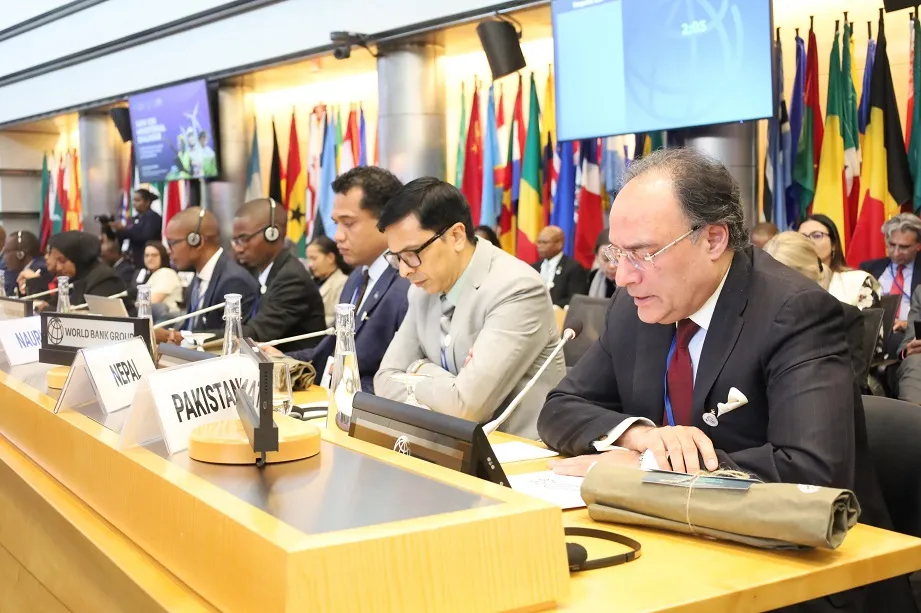Washington/Islamabad: The recent International Monetary Fund (IMF) and World Bank Spring Meetings in Washington concluded without providing much clarity on the future of the US tariff regime, leaving global financial leaders with more questions than answers.
Pakistan representation was quite well done by the Finance Minister and his team with Secretary Finance and Governor SBP.
Many participants came to the meetings hoping for insight into the Trump administration’s approach to tariffs and their potential impact on the world economy.
However, most left with an increasing sense of uncertainty.
Throughout the week, finance and trade ministers from various countries tried to engage with key officials from the Trump administration, including US Treasury Secretary Scott Bessent, but many efforts proved unsuccessful.
Those who did manage to meet with US officials were often told to remain patient, even as the clock counted down on the 90-day suspension that President Trump had granted on some of the harshest tariffs.
Polish Finance Minister Andrzej Domanski shared his concern about the US administration’s perspective on the situation.
He mentioned that officials in Washington believed the economic consequences of the tariffs would be short-term and manageable.
However, Domanski feared that what was expected to be a brief period of pain could turn into prolonged economic hardship for many countries.
The most significant trade negotiations held during the week were with Japan and South Korea. Despite claims from Bessent that discussions with both nations were “productive,” the results were far from conclusive.
World Economic Outlook
The IMF, while downgrading global growth forecasts in its World Economic Outlook, stopped short of forecasting recessions, even in countries like the US and China, which are particularly dependent on exports.
IMF Managing Director Kristalina Georgieva recognized the global anxiety caused by the ongoing uncertainty over trade and tariffs, in addition to the challenges posed by the pandemic, inflation, and geopolitical conflicts.
Despite these concerns, Georgieva expressed hope that ongoing trade talks would eventually provide some relief from the burden of tariffs.
However, some finance officials expressed skepticism over the IMF’s relatively optimistic forecast. They pointed to private sector predictions that placed the risk of recession much higher than the IMF’s stated 37 percent probability.
Debt risks also became a growing concern during the meetings. Eric LeCompte, the executive director of Jubilee USA Network, a faith-based nonprofit focused on debt relief, pointed out that while the IMF tried to downplay the potential for economic panic, many private discussions centered on the rising risk of debt crises in developing nations.
According to LeCompte, there was a general sense that the IMF’s response had been too passive, with little progress made on addressing the growing debt challenges faced by many countries.
Reza Baqir, former governor of Pakistan’s central bank and now head of sovereign debt advisory at Alvarez & Marsal, stressed that for many countries in the Global South, particularly in emerging markets, the Financing for Development agenda was sidelined during the discussions.
Read More: IMF-Pakistan-real-estate-tax-net
He questioned who would take up the cause of these nations when their concerns were not front and center.
Indermit Gill, the World Bank’s chief economist, also raised alarms over the rising levels of debt in emerging markets, noting that the tariffs had contributed to a significant slowdown in trade and foreign direct investment, which are crucial for the growth of developing economies.
While some policymakers expressed relief over the US reaffirming its support for the IMF and the World Bank, they were quick to point out that the US administration had grown increasingly critical of these institutions’ expanding focus on issues such as climate change, gender equality, and social justice.
Bessent, for example, criticized what he called the “mission creep” of the IMF and World Bank, suggesting that their mandates had strayed too far from their core missions.
Early in the week, Bessent had sparked optimism when he made comments suggesting that the trade tensions between the US and China over tariffs were unsustainable and that a deal might be reached soon.
However, these hopes were quickly dashed when China denied that any serious tariff negotiations were underway, adding to the confusion and further complicating an already complex situation.
In conclusion, while there were some moments of cautious optimism during the meetings, the lack of substantial progress on key issues left global finance leaders with more questions than answers.
Also Read: IMF Sounds Alarm
The ongoing uncertainty surrounding US tariffs, global trade negotiations, and the rising debt challenges in developing nations continued to loom large, casting a shadow over the overall outcomes of the meetings.









